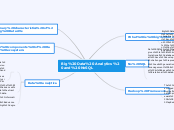Big Data Analytics and NoSQL
What is big Data?
Big Data generally refers to a set of data that displays the characteristics of volume, velocity,
and variety (the “3 Vs”) to an extent that makes the data unsuitable for management by
a relational database management system.
No SQL
No SQL is the unfortunate name given to a broad array of non relational database technologies
that have developed to address the challenges represented by Big Data
A new generation of
database management
systems that is not
based on the traditional
relational database
model.
Hadoop Framework
The Hadoop framework has quickly emerged as a standard for the physical storage
of Big Data. The primary components of the framework include the Hadoop Distributed
File System (HDFS) and MapReduce
primary characteristics of Big Data.3Vs
Volume—the quantity of data to be stored
Velocity—the speed at which data is entering the system
Variety—the variations in the structure of the data to be stored
Major components of Hadoop ecosystem.
1MapReduce Simplification Applications
2.Data Ingestion Applications
3.Direct Query Applications
Data analytics.
Data mining automates the analysis of operational data to find previously unknown
data characteristics, relationships, dependencies, and trends. The data-mining process
has four phases: data preparation, data analysis and classification, knowledge
acquisition, and prognosis.
Data analytics is a subset of BI functionality that provides advanced data analysis
tools to extract knowledge from business data.
Predictive analytics uses the information generated in the data-mining phase to create
advanced predictive models with high degrees of accuracy.
